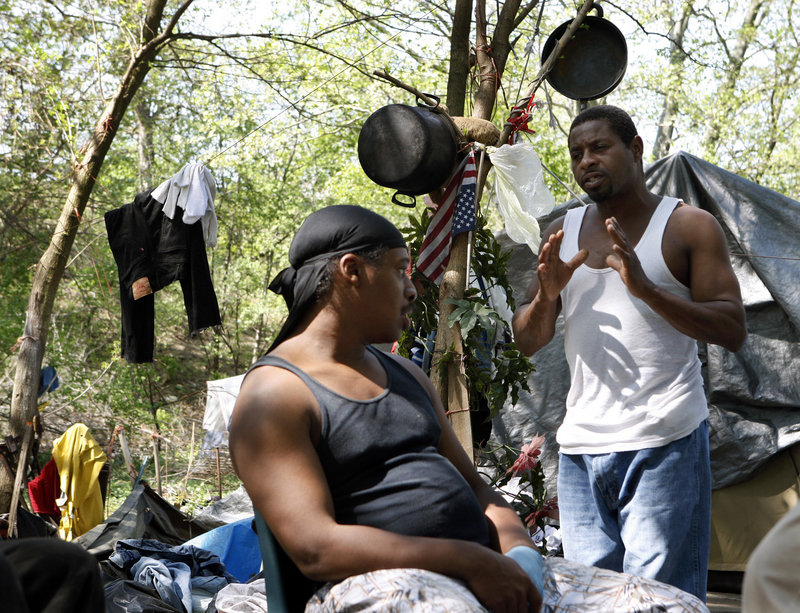CAMDEN, N.J. — Marvin Tomlinson has lived in Tent City on and off since the homeless enclave was founded about four years ago in a patch of woods between railroad tracks and a highway off-ramp.
Fighting crack and alcohol addictions, he has found life a struggle since leaving prison in 2002 after serving 16 years for manslaughter.
But he has also found a purpose as he saws logs and throws them into a fire pit which camp cooks will use to make supper from donated potatoes and canned beans.
Tomlinson, 43, looks over the tents in the community he helped build. “This right here,” he said, “is an accomplishment.”
But it might go away.
The county was hoping to shut down the self-governing society by today. Officials say its residents need to find new places to live — a cold-turkey approach to reducing homelessness.
The eviction notice is startling for the people who make their home in Tent City, a place officials have tolerated, even as it grew from a few people to at least 100 last summer. It’s on the brink of closure partly because the founder asked officials to help its residents.
Social service agencies say they’re not sure there are enough spaces if everyone who is kicked out seeks shelter space. And while some residents say they would be grateful to have roofs over their heads, others just want to be left alone.
Tent City has become a municipality unto itself, complete with a mayor. Sixteen simple rules are written on boards that hang on a tree. No. 1, “No arguing”; No. 3, “No borrowing money or sex from anyone”; No. 7, “Don’t bring your drama here or you’ll be evicted.” Residents say the rules generally are followed. Evictions and arrests are rare.
Most residents bought their tents with money from jobs, disability checks or other sources. Some people have portable toilets lined with trash bags; others relieve themselves among the trees. Residents also go to agencies that provide have bathrooms, sinks and showers.
Many of the residents have mental illnesses or drug addictions. Some don’t want to give their names for fear their relatives will learn what’s become of their lives.
Tent City began when Lorenzo Banks, known as Jamaica, came upon the space as he walked along the adjacent railroad tracks. Banks said he’s a Vietnam War veteran who “doesn’t do inside.”
The publicly owned site was littered with thousands of hypodermic needles and clothing. Once Banks got it clean, occupancy grew. In-house security officers — residents who volunteer — roam the area with walkie-talkies, mostly trying to keep out intruders.
Residents prepare three meals a day to share. There’s a mandatory meeting every Tuesday for Bible study and to talk about issues in the settlement.
“It’s a lot of good here in Transitional Park. It’s not about being homeless and helpless,” Banks said. “It’s about trying to overcome your fears of society.”
Volunteers and social workers regularly check in to offer everything from peanut butter and jelly sandwiches to drug treatment programs.
As Tent City’s mayor, Banks went to the Camden County Community Development Program last year, hoping to get his constituents help with finding housing and getting services.
That’s when the idea came to shut down the camp, said program director Gino Lewis.
“This particular community cannot survive the way it is,” he said. “There’s lack of sanitation, there’s health issues. So we want to make sure we try to transition them to facilities that will help them.”
Harold Miller, an outreach worker with the nonprofit service group Volunteers of America Delaware Valley, isn’t sure there’s space for Tent City dwellers in local treatment centers and apartments.
“Knock them out of homelessness into more homelessness,” he lamented. “How do you do that?”
Copy the Story Link
Send questions/comments to the editors.



Success. Please wait for the page to reload. If the page does not reload within 5 seconds, please refresh the page.
Enter your email and password to access comments.
Hi, to comment on stories you must . This profile is in addition to your subscription and website login.
Already have a commenting profile? .
Invalid username/password.
Please check your email to confirm and complete your registration.
Only subscribers are eligible to post comments. Please subscribe or login first for digital access. Here’s why.
Use the form below to reset your password. When you've submitted your account email, we will send an email with a reset code.